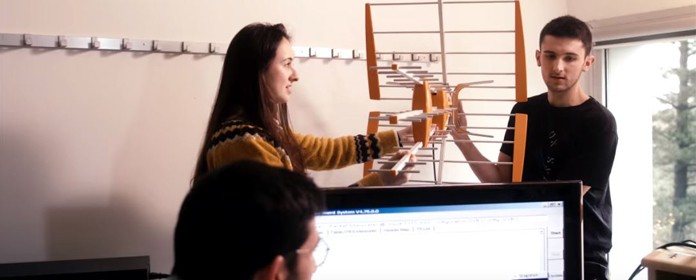News
LATEST NEWS AND EVENTS FROM THE SCHOOL OF ENGINEERING
Telecommunication engineering turns 100 years old
Professor Héctor Solar reviews World Telecommunication Day

May 17 is World Telecommunications Day and Héctor Solar, professor at Tecnun, reviews the first 100 years of telecommunications engineering.
On April 22, 1920, the degree of Telecommunications Engineering was born in Spain. Telecommunications Engineering, and represents the origin of the Telecommunications Engineering profession as it is known today.
Its origin dates back to the middle of the 19th century thanks to the interest aroused by the birth of telegraphy, with the creation of the first Telegraph Corps. However, the sinking of the Titanic in 1912 and the International Radiotelegraphic lecture of London in 1913, showed the need to order the correct use of radio communication systems and to organize the training of the operators of these systems. Thus, the General School of Telegraphy was born, where the beginning of Telecommunication Engineering could be glimpsed. The studies in this School consisted of three courses, where subjects such as Mathematics, Physics, Chemistry, Topography, Drawing, Electricity, Telecommunication, Mechanics, Law, English or German were learned.
Only one year later, the General School of Telegraphy changed its name to the Official School of Telegraphy, where the first period of training was in the techniques of use of telegraphy and, after a final work on some of the knowledge acquired, it was possible to access a complementary period for the scientific study of communications systems. A total of 16 students were the first to access these studies.
However, it was not until the famous April 22, 1920 when the teachings of this School were reorganized, in the style of the university ones, to be able to access the title of "Telecommunication Engineer". That was the first time that this name was mentioned in an official document and, therefore, formally represents the date of birth of this profession.
A close reference of that time can be found in Ignacio María Echaide Lizasoain from San Sebastian, being an industrial engineer - Telecommunication engineering did not yet exist - he began to manage the provincial telephone company of Gipuzkoa in 1909. He took the telephone service to the most remote localities of the province and, in fact, in 1926 he implemented the first automatic telephone network in Spain. A section of the telephone central switchboard can be visited, and even used since it is still in operation, at the Ibaeta headquarters of Tecnun.
The reorganization of the studies allowed the possibility that students who had completed higher studies at the Official School could opt for the title of Telecommunications Engineer. And so it was that those 16 students, mentioned above, would obtain the following year, in 1921, the official degree that made them the first Telecommunication Engineers in our history.
That Official School of Telegraphy of 1920 would change its name to Official School of Telecommunications in 1930, opening its doors to all subject of national or foreign students not necessarily coming from the Telegraph Corps.
During these 100 years, Telecommunication Engineers have been the protagonists of the great technological changes in society. They have put the instructions of communication technologies that are part of our lives today: mobile telephony and its applications, digital television, satellite communication systems, positioning systems such as GPS, Internet, fiber optic networks and so on, and so on.
Certainly, although 100 years later the name of Telecommunication Engineering has not changed, what has changed are the technologies in which a Telecommunication Engineer is an expert. What student of that first promotion of telecommunication engineers could imagine that in such a short time we would go from telegraphy to 5G networks with a smartphone in our hand?
In these times of health crisis we have witnessed how telecommunications have been able to bring us closer to people who were far away or even those who were going through difficult times. During these weeks many telecommunication engineers have remained at their posts to keep the telecommunication networks active and to meet the growing demand for their use, perhaps knowing that not many people remember them when they go out to their balconies and windows at 8 pm. However, this pandemic has also shown that telecommunications are necessary in any country, both in times of crisis such as the current one, as well as to meet the challenges that lie ahead.
In this emblematic year for the history of this profession we must look back to thank all the engineers who in the past decades have dedicated their talents and energies to do their bit for the progress of society.
And also look to the future, because this profession will be the protagonist of many other major challenges such as the internet of things, intelligent transport systems, Industry 4.0, Cybersecurity, data science, cloud systems, new technologies in health, in the energy sector or artificial intelligence.
source historical